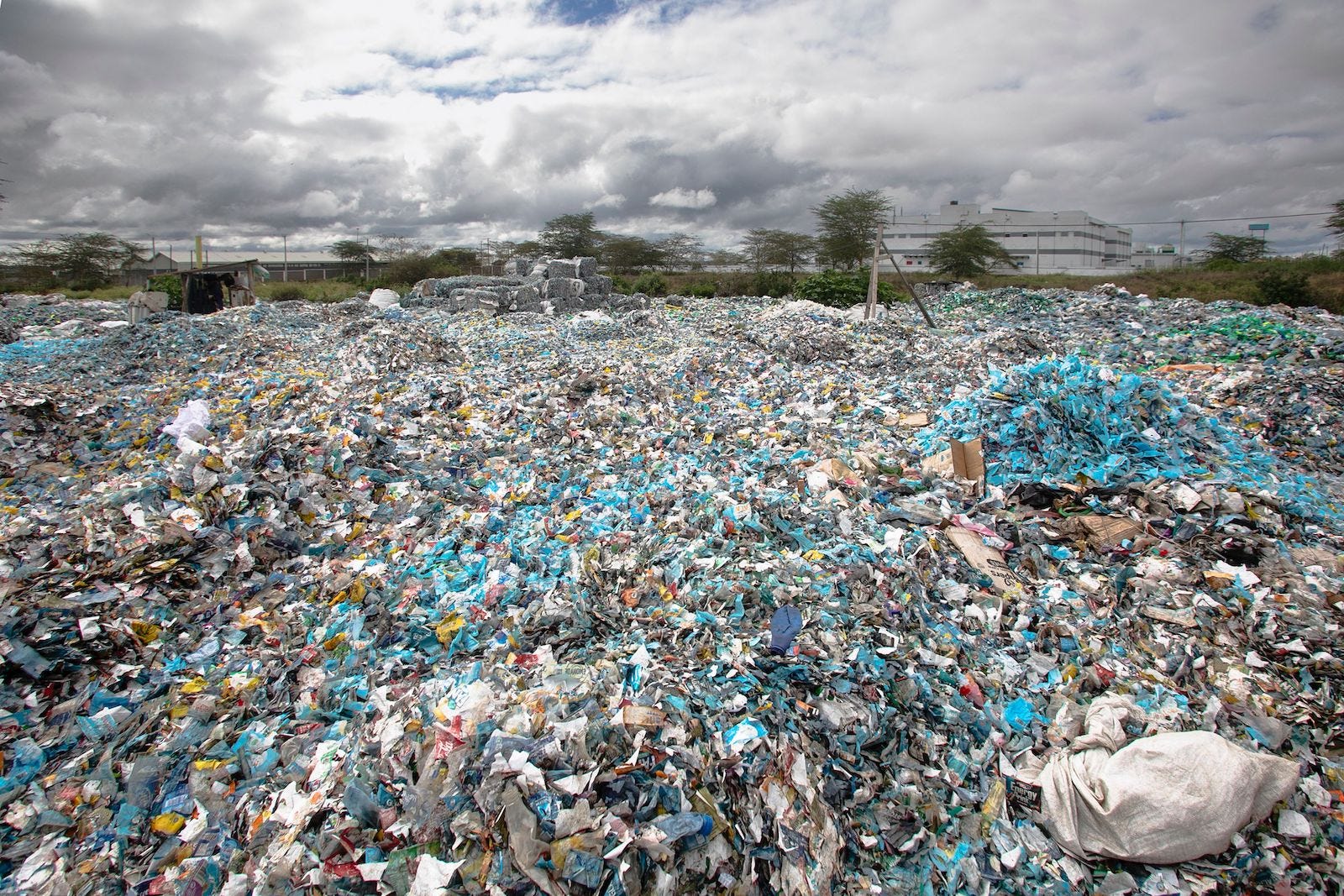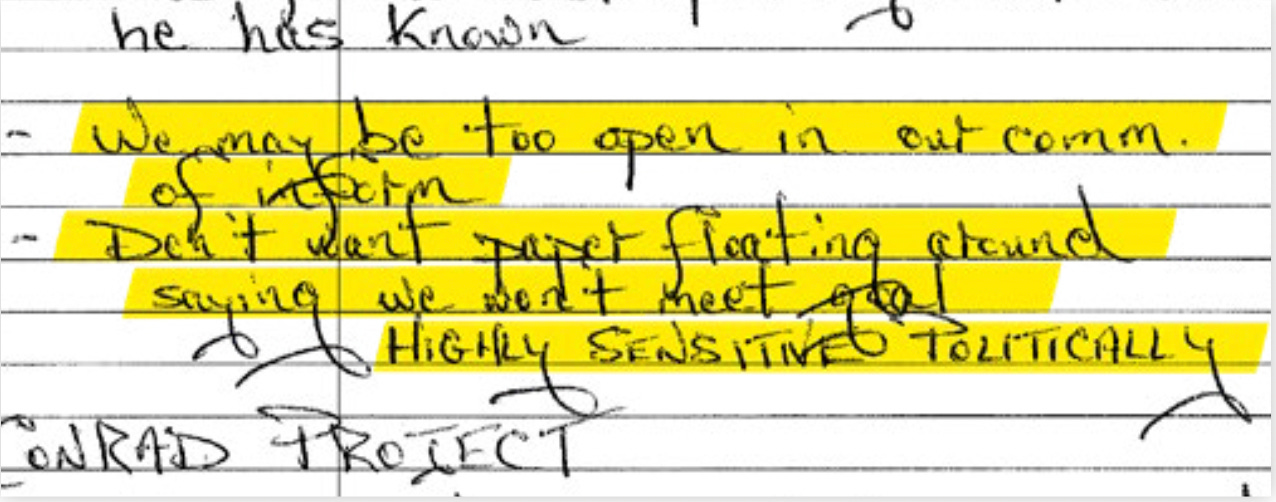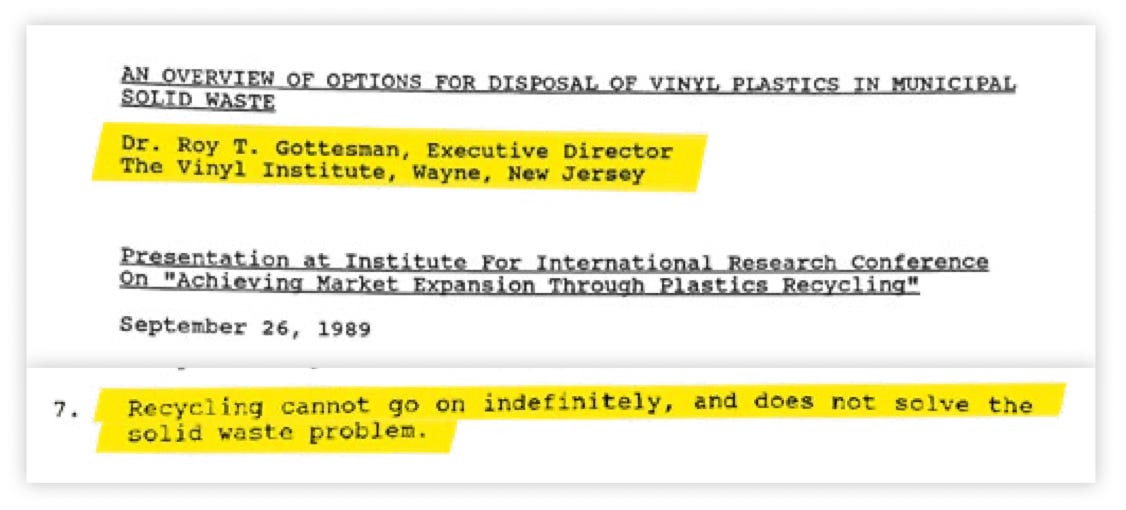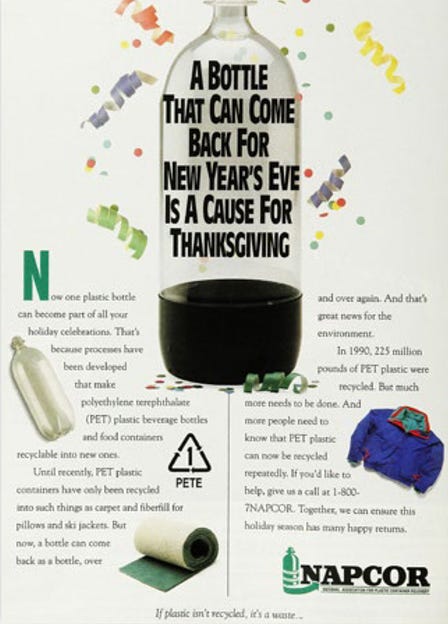HEATED - Plastic recycling is a scam
Happy Friday—Emily here. Arielle’s been working hard this week, picking up the reporting slack while I’m home taking care of my mom. Plastic recycling is a scamThe fossil fuel industry has known for decades that recycling alone won't solve the plastic crisis. But it's spending millions to convince the public otherwise.The plastic pollution crisis is so severe some experts say that it is now on par with the climate crisis. It shows no sign of slowing down, with plastic pollution expected to double by 2030. Over the next two decades, the amount of plastic in the ocean could reach 600 million tons, the same weight of 3 million blue whales. But the plastics industry wants to assure the public that it has a solution. Last month, the industry group America’s Plastic Makers released a national TV commercial claiming recycling programs are addressing pollution. Recycling plastic is “making the planet cleaner and healthier,” the ad said, alongside images of windmills and solar panels. It said recycling is “making sustainable change” that will “benefit generations to come.” There’s just one problem: the ad is a lie. Recycling—which works for materials like paper, glass, and aluminum—is not making a meaningful dent in plastic pollution. Only 5 to 6 percent of U.S. plastics are actually recycled annually, and less than 10 percent of plastic waste is recycled globally. The other 350 million tons of plastic waste generated each year ends up in landfills, incinerators, ecosystems, and bodies. One study estimates that each person ingests up to one credit card worth of plastic each week. And here’s the kicker: The plastics industry has known that recycling doesn’t work for decades. A new report from the Center for Climate Integrity details the deception, showing that the plastics industry has privately admitted in internal communication since the 1960s that the process is not effective. Still, despite knowing that recycling can’t solve the plastic crisis, the industry has spent millions on ads trying to convince the public otherwise. Because when your primary objective is profit, you’d rather see world covered in your product than a world that simply uses less. How plastic insiders talk about recyclingThe Center for Climate Integrity has compiled heaps of evidence showing that plastics industry insiders have long known about the vast limitations of plastic recycling. One of the first documented admissions came in 1969, when Eric B. Outwater, a member of an early industry front group, told attendees of a conference on packaging waste that the economics of recycling are “virtually hopeless.” That’s because packaging made out of multiple types of plastic is “virtually unrecoverable after use,” he said. That same year, the industry group the American Chemical Society came to a similar conclusion, noting that the plastics industry would never truly embrace recycling on a massive scale unless it became profitable. “It is always possible that scientists and engineers will learn to recycle or dispose of wastes at a profit,” the group wrote in a report for Chemical & Engineering News, “but that does not seem likely to happen soon on a broad basis.” A few decades later, in 1986, the trade association The Vinyl Institute reported that “recycling cannot be considered a permanent solid waste solution, as it merely prolongs the time until an item is disposed of.” In 1989, The Vinyl Institute’s founder, Roy Gottesman, explained to attendees of a plastic recycling conference that “Recycling cannot go on indefinitely, and does not solve the solid waste problem.” In 1994, a vice president at Exxon Chemical explained that recycling promises were often made for show. “We are committed to the activities, but not committed to the results,” he said at a meeting of the American Plastics Council, after the company missed its recycling targets. Exxon’s Irwin Levowitz also advised the Council to keep quiet about missed targets. “[We] don’t want paper floating around saying we won’t meet [our] goal” Levowitz wrote in a memo, marked “HIGHLY SENSITIVE POLITICALLY.” European plastic groups have also long acknowledged the limitations of recycling. “Recycling is not always the best option as it does not always effect [sic] greatest environmental gain,” explained the European Vinyls Corporation in 1993. In 1996, a report from the Association of Plastics Manufacturers in Europe acknowledged that “there is a limit…to the amount of household plastics waste which can be mechanically recycled with environmental gain.” Even the recycling symbols found on the bottom of plastic bottles and containers are a greenwashing tactic by the industry, according to state government officials. At the time of their adoption in 1990, the Connecticut Department of Environmental Conservation pointed out the truth: “The recycling symbol suggests that the plastic containers are made of recycled material or that they are recyclable. This is, in practice, generally not the case.” A decades-long PR scamYet despite saying all this privately for decades, petrochemical companies have consistently claimed in ads, op-eds, and political advocacy that the plastic waste crisis can be solved by recycling. The reason they’ve done this is not because they actually believe in the miracle of recycling. It’s because they fear the real solution to the plastic waste crisis: regulation on the production and disposal of plastic. The Center for Climate Integrity’s new report details internal communications that reveal the industry’s motivation. In a 1984 memo, The Society of the Plastics Industry clearly laid out the stakes: Lawmakers “must see substantial short-term progress in the recycling of plastic containers, or else punitive legislation … will attack the problem head-on.” In other words, without a convincing campaign promoting recycling, lawmakers would regulate plastic pollution. In the early 90s, plastics industry experts claimed that there were more than 500 bills proposals related to plastic waste management across all levels of government. “The call was to recycle or be banned,” an Occidental Chemical employee testified to Congress in 1992. To forestall future legislation, companies like Exxon, Chevron, Dow, and DuPont spent tens of millions of dollars in the 90s on ads promoting the benefits of plastics, an investigation by NPR and PBS Frontline. One DuPont ad claimed “We've pioneered the country's largest, most comprehensive plastic recycling program to help plastic fill valuable uses and roles.” Another ad placed in Ladies’ Home Journal in 1991 falsely claimed that “A bottle can come back as a bottle, over and over again.” An industry ad told Chicago Tribune readers that they should “Recycle Plastic to Save Landfill Space” to celebrate Earth Day in 1992. The plastics industry even made materials for schools. One educational video falsely claimed that “most plastics can be melted and reused over and over again.” In a staff meeting about the video, an American Plastics Council spokesperson admitted, “it is propaganda.” The results of the marketing blitz were successful. By 1995, a columnist for Plastic News wrote that “[t]he plastics recycling war is over. We should declare victory and put the money into cancer research.” The industry’s recycling-focused public-facing messaging continues today. Last year, at a meeting of the United Nations negotiating a global treaty ending plastic pollution, industry representatives worked to influence the talks. The American Fuel & Petrochemical Manufacturers, an industry lobby group, told the U.N. that they are “committed to sustainably manufacturing the petrochemicals and derivatives for plastics.” Their solution was not to produce less plastic, but to recycle more. In addition, in the last few years, plastic lobby groups have sold lawmakers on a new solution to plastic waste: “advanced recycling”, also known as chemical recycling. Chemical recycling is meant to tackle the difficulties of recycling different materials by using extreme heat or chemicals to break plastic into chemical elements. But this type of “recycling” rarely produces new plastic; instead, the vast majority produce either an oil byproduct or hazardous waste. Still, the industry is using “advanced recycling” promises to respond to the new report’s charges of deception. “We’ve set an ambitious goal for all US plastic packaging to be reused, recycled, and recovered by 2040,” Ross Eisenberg, president of America’s Plastic Makers, said in a recent statement. “Investments in advanced recycling can be a game changer to better manage our vital plastic resources.” “We will not solve the climate crisis if we’re still producing plastic.”According to environmental experts, the most effective solution to the plastic waste crisis lies not in recycling, but in producing less plastic in the first place. One analysis published in the journal Science found that the world could cut 80 percent of plastic pollution by reducing plastic production and consumption, using alternatives like paper or compostable materials, and expanding waste collection in middle and low-income countries. That doesn’t mean we shouldn’t recycle plastic at all, though. Studies have found that in order to reduce plastic pollution to zero, we’ll need to use multiple strategies—including increasing recyclable packaging. “We’ll have to make sure that more than 50 percent of plastic is designed to be recycled,” said Yoni Shiran, partner at sustainability consulting firm SYSTEMIQ, in a presentation with the U.N. Environment Program. But recycling alone isn’t enough—it has to be combined with producing and using less plastic. “If you do any of those things on their own you will not be solving the problem,” said Shiran. And for changes to be truly effective, experts say they must be made by governments, not by individual consumers. A proposed bill in New York, for example, would cut the state’s plastic packaging in half over the next 12 years. Large plastic users like Amazon or Walmart would be responsible for reducing their use of single-use plastic packaging. Businesses would also be incentivized to use recyclable or refillable packaging, and required to pay for recycling their waste. If passed, the bill would be the most comprehensive plastic packaging regulation in the country. But it needs support from the public to move forward. Further reading
Catch of the day: This cutie may be pretending to be beach flotsam, but really she’s a socially awkward mutt with a heart of gold, says reader Heather. When Moxie isn’t laying on the sand, she’s determined to be crowned the fastest dog in the world. Want to see your furry (or non-furry!) friend in HEATED? It might take a little while, but we WILL get to yours eventually! Just send a picture and some words to catchoftheday@heated.world. You're currently a free subscriber to HEATED. For the full experience, upgrade your subscription. |
Older messages
Our demand for cheap plastics is choking this town
Tuesday, February 27, 2024
Arielle goes on a "toxic tour" of Port Arthur, Texas to experience the local impact of plastics: the fossil fuel industry's strategy to survive the clean energy transition. ͏ ͏ ͏ ͏
A note from Emily
Wednesday, February 21, 2024
Why we won't be publishing this week. ͏ ͏ ͏ ͏ ͏ ͏ ͏ ͏ ͏ ͏ ͏ ͏ ͏ ͏ ͏ ͏ ͏ ͏ ͏ ͏ ͏ ͏ ͏ ͏ ͏ ͏ ͏ ͏ ͏ ͏ ͏ ͏ ͏ ͏ ͏ ͏ ͏ ͏ ͏ ͏
There's no such thing as a “climate-friendly” Super Bowl
Tuesday, February 13, 2024
Plus, a round-up of climate highlights from the game. ͏ ͏ ͏ ͏ ͏ ͏ ͏ ͏ ͏ ͏ ͏ ͏ ͏ ͏ ͏ ͏ ͏ ͏ ͏ ͏ ͏ ͏ ͏ ͏ ͏ ͏ ͏ ͏ ͏ ͏ ͏ ͏ ͏ ͏ ͏ ͏ ͏
“The Daily” runs a greenwashing BP ad
Tuesday, February 6, 2024
The Daily promised to end fossil fuel sponsorships in 2021. BP promised to stop “corporate reputation advertising” in 2020.
Understanding Biden's LNG decision
Thursday, February 1, 2024
There's a lot of politically-motivated misinformation floating around about it. Here's what's really happening.
You Might Also Like
“Fog” by Emma Lazarus
Saturday, March 1, 2025
Light silken curtain, colorless and soft, / Dreamlike before me floating! ͏ ͏ ͏ ͏ ͏ ͏ ͏ ͏ ͏ ͏ ͏ ͏ ͏ ͏ ͏ ͏ ͏ ͏ ͏ ͏ ͏ ͏ ͏ ͏ ͏ ͏ ͏ ͏ ͏ ͏ ͏ ͏
savourites 96
Saturday, March 1, 2025
escaping the city | abandoning my phone | olive oil ice cream ͏ ͏ ͏ ͏ ͏ ͏ ͏ ͏ ͏ ͏ ͏ ͏ ͏ ͏ ͏ ͏ ͏ ͏ ͏ ͏ ͏ ͏ ͏ ͏ ͏ ͏ ͏ ͏ ͏ ͏ ͏ ͏ ͏ ͏ ͏ ͏ ͏ ͏ ͏ ͏ ͏ ͏ ͏ ͏ ͏ ͏ ͏ ͏ ͏ ͏ ͏ ͏ ͏ ͏ ͏ ͏ ͏ ͏ ͏ ͏ ͏ ͏ ͏ ͏ ͏ ͏ ͏ ͏ ͏ ͏
5-Bullet Friday — How to Choose Peace of Mind Over Productivity, Guinean Beats for Winding Down, Lessons from Legendary Coach Raveling, and a New Chapter from THE NO BOOK
Saturday, March 1, 2025
"Easy, relaxed, breathing always leads to surprise: at how centred we already are, how unhurried we are underneath it all." — David Whyte ͏ ͏ ͏ ͏ ͏ ͏ ͏ ͏ ͏ ͏ ͏ ͏ ͏ ͏ ͏ ͏ ͏ ͏ ͏ ͏ ͏ ͏ ͏ ͏ ͏ ͏ ͏
Nicole Kidman's “Butter Biscuit” Hair Transformation Is A Perfect Color Refresh
Saturday, March 1, 2025
Just in time for spring. The Zoe Report Daily The Zoe Report 2.28.2025 Nicole Kidman's “Butter Biscuit” Hair Transformation Is A Perfect Color Refresh (Celebrity) Nicole Kidman's “Butter
David Beckham's Lifestyle Keeps Him Shredded at 50
Friday, February 28, 2025
View in Browser Men's Health SHOP MVP EXCLUSIVES SUBSCRIBE David Beckham's Lifestyle Keeps Him Shredded at 50 David Beckham's Lifestyle Keeps Him Shredded at 50 The soccer legend opens up
7 Home Upgrades That Require Zero Tools
Friday, February 28, 2025
Skype Is Dead. There are plenty of ways to make quick improvements to your house without a single hammer or screwdriver. Not displaying correctly? View this newsletter online. TODAY'S FEATURED
Heidi Klum Matched Her Red Thong To Her Shoes Like A Total Pro
Friday, February 28, 2025
Plus, the benefits of "brain flossing," your daily horoscope, and more. Feb. 28, 2025 Bustle Daily Here's every zodiac sign's horoscope for March 2025. ASTROLOGY Here's Your March
How Trans Teens Are Dealing With Trump 2.0, in Their Words
Friday, February 28, 2025
Today in style, self, culture, and power. The Cut February 28, 2025 POWER How Trans Teens Are Dealing With Trump 2.0, in Their Words “Being called your correct name and pronouns can be the difference
The Eater Oscars for best bites in film this year
Friday, February 28, 2025
An NYC cafe garners celebrity support after rent hike
The Must-See Movies The Oscars Overlooked
Friday, February 28, 2025
Plus: Celebrities pay tribute to Michelle Trachtenberg. • Feb. 28, 2025 Up Next Your complete guide to industry-shaping entertainment news, exclusive interviews with A-list celebs, and what you should







